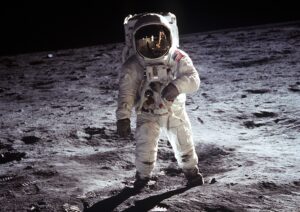Safety first
For one, safety is becoming a pressing issue, both for human life in outer space and back here on Earth. The recent Titan disaster, where all passengers of a deep-sea tourist cruise perished (presumably because the vessel owner was cutting corners with safety features) highlights the risks of commercial space tourism, including the trips to the Moon that some companies have recently started offering for well-situated clients.
In November 2022, falling debris from a Chinese Long March rocket led to the brief closure of the entire Spanish airspace. In April 2023, a SpaceX launch in Texas created a vast cloud of dust that likely caused considerable environmental harm in the vicinity, leading to questions about the ability and willingness of US regulatory agencies to keep the industrial giant in check.
With growing traffic between the Earth and the Moon, questions of safety and regulatory oversight will become more urgent.
No jurisdiction – no rules?
There are also broader legal issues at stake. The Moon is technically an area beyond national jurisdiction, meaning that national laws do not apply, and states cannot make territorial claims. But could they extract and own lunar resources, such as ice deposits that could be made into vast reserves of oxygen, water, and hydrogen fuel? Could private companies make property claims where no national legislation exists? And how does international law apply to the lunar activities of both states and private organizations?
The 1967 Outer Space Treaty, for example, requires that exploration and use of space “shall be carried out for the benefit and in the interests of all countries”. With growing commercial interest in space tourism, there is a real need to clarify which space-based activities serve greater human needs and which would be no more than a fancy pastime for billionaires.
Avoiding a galactic dumping ground
As space agencies and private companies keep crashing their landers into the Moon, we should also start to think more carefully about the lunar environment. A massive cloud of junk, from spacecraft and derelict satellites, is already circling the Earth, increasingly posing a threat to spaceflight and the orbital infrastructure.
Nuclear power has been a primary energy source for space vehicles for decades, and questions of reactor safety and safe waste disposal are becoming more urgent as they increase in number.
China and the US both aim to construct permanent bases on the Moon within the coming decade. This likely requires the extraction and utilization of lunar raw materials, such as rocks, as bulk construction materials are simply too expensive to ship from Earth. Drilling and construction work on the moon could easily cause significant environmental harm. The same applies for the commercial extraction of lunar resources, such as precious Rare Earth Elements, which various private companies are currently exploring.
It thus appears prudent to consider effective measures for protecting the Moon and its environment as the common heritage of humanity. After all, since we are close to ruining the Earth’s environment, perhaps we could act a little bit more responsibly with the rest of our solar system.
Florian Rabitz, Inga Popovaitė and Vidas Vilčinskas are researchers at KTU’s Faculty of Social Sciences, Arts and Humanities working on the project “The Transnationalization of Outer Space”, funded by the Research Council of Lithuania (project no. P-MIP-23-234).




